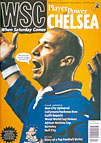 Clydebank are the latest Scottish club to encounter financial difficulties. Colin McPherson analyses what the future holds
Clydebank are the latest Scottish club to encounter financial difficulties. Colin McPherson analyses what the future holds
Stop me if you’ve heard this before: Small, modestly successful Scottish club, relatively new to the League, finds itself asset stripped, relegated and threatened with a move to another part of the footballing world, without a care for their loyal band of long-suffering supporters.
After Meadowbank, it’s the turn of Clydebank to become involved in a scheme to relocate the club and change their name. And if that sounds like a nightmare, the plan of the new owners of the Second Division leaders to move the club to Dublin is surely one piece of franchising too far.
Not according to John Hall and his sidekicks who bought Clydebank for just £240,000 last summer from the notorious Steedman brothers, who had spent the previous two years literally stripping the club of anything that was of value, and a few things that weren’t. Blaming the Bosman ruling, which they claimed would make it impossible to sustain the Bankies at a successful level, they set about dismantling Clydebank. First New Kilbowie Park, the trim 10,000 capacity all-seater stadium, was sold forcing the club to play home matches a dozen miles away at the home of local rivals Dumbarton. Then before the Steedmans handed over control to the new consortium, they sold several players at tumbledown prices, even going to absurd lengths such as filling up the directors’ cars on the club’s account on the very day they sped away, reputedly around £2m richer for their exertions.
Whether the ambitious idea of moving to Dublin should or come off is subject to fierce debate on the sports and letters pages in the Scottish media. It is thought that few of the newly all-powerful Premier Division clubs are in favour and certainly the SFA remains implacably against the proposal on moral grounds (Berwick Rangers notwithstanding they don’t want foreign bodies cross-contaminating our game). However, as usual it is on the supporters that the spotlight falls in such crises. Blamed, naturally, for the dire straits the club finds itself, yet without the power to change or prevent a move which would be their nemesis, the 200 members of the United Clydebank Supporters continue a campaign which they hope will eventually lead to the club coming home. The group’s initials recall the heroic efforts of workers at the Upper Clyde Shipbuilders who, in 1971, staged a work-in to save their jobs in the famous Clydebank yard. Shipbuilding has gradually withered in the town since then, but the latter-day UCS are determined to fight for a better outcome to this post-industrial dispute.
When it comes to the prospect of saving his club, Gordon Robertson, spokesman for the UCS, is as phlegmatic as a blindfolded goalie trying to save a penalty. “The club is going to die of naivete,” he says, referring to the starry-eyed optimism of John Hall, who reckoned Clydebank could afford its 15 full-time players with average home gates of 2,000. As many other clubs in post-Souness Scotland are finding out, the punters are just not turning up to watch an over-priced, sub-standard ‘product’ in such numbers, and there are at least half a dozen clubs piling up unsustainable debts.
It may be out of Gordon Robertson’s hands whether he can help save the club he has followed for 20 years, but a vigorous cam-paign of lobbying local councillors and business for support has identified a site on which the club could start again, even if the franchise disappeared to Dublin. Recalling the dizzying days of successive promotions which took the club to the Premier Division just a dozen years after stepping up from the Juniors, and the delights of the magical skills of a young Davie Cooper, who graced Kilbowie at the start of a memorable career, the current Clydebank fans are not going to give in lightly.
Gordon Robertson is careful not to predict what will become of his club. As he stoically states, “The future’s everything for football supporters.” The burning question for Clydebank is: ‘What future?’
From WSC 134 April 1998. What was happening this month